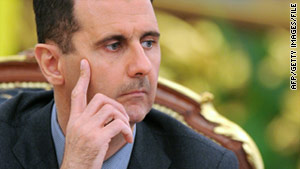
Having watched the rulers of Egypt and Tunisia let their rebellious subjects gather strength in the streets and then tumble them from power, the ruler of Syria, Bashar al-Assad, seems to be taking no chances. Only a leaf had to stir – schoolchildren daubing a wall with slogans of neighbouring revolts relayed by satellite television – and his security services started shooting down unarmed protesters, first in Deraa in the south and now across the country. This is a perilous path, for his regime and Syria.
In a sense, this is the second time round for President Assad. In 2005, after the assassination of Lebanon’s former prime minister, Rafiq Hariri – in which Damascus is widely held to be complicit – he watched how satellite and digital media helped magnify the tumultuous protests into the “Cedar Revolution” that drove Syria out of Lebanon after 29 years of occupation.
Knowledgeable observers of Syria say the regime is now divided between the president, who would prefer to conciliate and co-opt, and his brother Maher al-Assad, commander of the Republican Guard, and brother-in-law Asef Shawkat, head of military intelligence, who want to keep firing. They are doing both: releasing political prisoners and promising an end to the emergency law under which the Ba’ath party has ruled Syria since 1963; and shooting demonstrators.
Rebellion is spreading from the south, to the capital and to Homs and Hama in the centre, and now to the north-west. The government acknowledged 12 deaths over the weekend in Latakia, the port city and heartland of the Alawite minority that rules Sunni-majority Syria behind the Ba’ath facade.
The last time elements of Syria’s Sunni majority rose, in an Islamist insurrection under the Muslim Brotherhood in 1982, Mr Assad’s father, the formidable Hafez al-Assad from whom he inherited power, razed the city of Hama over their heads, killing tens of thousands. Will the son emulate his father’s ruthless resolution, or take the path of reform?
While it is a truism that dictatorships are never more vulnerable than when they try to reform under pressure from the streets, it is also true that Mr Assad cannot repeat Hama. A massacre of those proportions could no longer take place offstage, as it did in 1982, but will be transmitted worldwide – and set Syria on fire.
Syria, which styles itself the “beating heart” of Arabism and Arab resistance to Israel, is playing on its people’s fear of a regime never afraid to use violence.
Buthaina Sha’aban, the president’s interlocutor with the outside world, says her boss is “the target of a plot to sow sectarian strife” and destroy Syria’s “unique model of coexistence”. The regime blames the unrest on “armed gangs” and foreign “agents”.
While the Assads have upheld multi-confessional tolerance at home, they have never hesitated in fomenting sectarian strife abroad. In Lebanon they reconsecrated the prewar sectarian system, to highlight Syria’s indispensable role as arbiter, and undermined attempts to build national challenges to their rule. Aligned with Shia Iran and merciless with homegrown Islamists, Syria was a funnel for Sunni jihadis entering Iraq to wreak havoc against the US-led occupation and the new Shia-dominated order there.
The regime’s “resistance” credentials are threadbare too. Syria narrowly failed in the 1973 Arab-Israeli war to recapture the Golan Heights seized by Israel in the 1967 Six day war. Since then, it has hardly fired a shot, as the Assad regimes have preferred to needle Israel through proxies such as Hizbollah in Lebanon and Hamas in the Palestinian territories. After Republican Guards entered Deraa last week, demonstrators taunted Maher al-Assad, their commander: “Maher, you coward, send your troops to liberate the Golan.”
Many Syrians have seen through the hollow rhetoric, and the spider’s web of crony capitalism. They have been burning down not only Ba’ath party offices but local outlets of businesses owned by Rami Makhlouf, cousin to the Assads and billionaire beneficiary of their rule.
Inspired by their Arab cousins, and inflamed by the insolence of the regime’s repression, they are losing their fear. They cannot all be shot down. The question Bashar al-Assad faces now is whether they can be reconciled. FT

Leave a Reply
You must be logged in to post a comment.